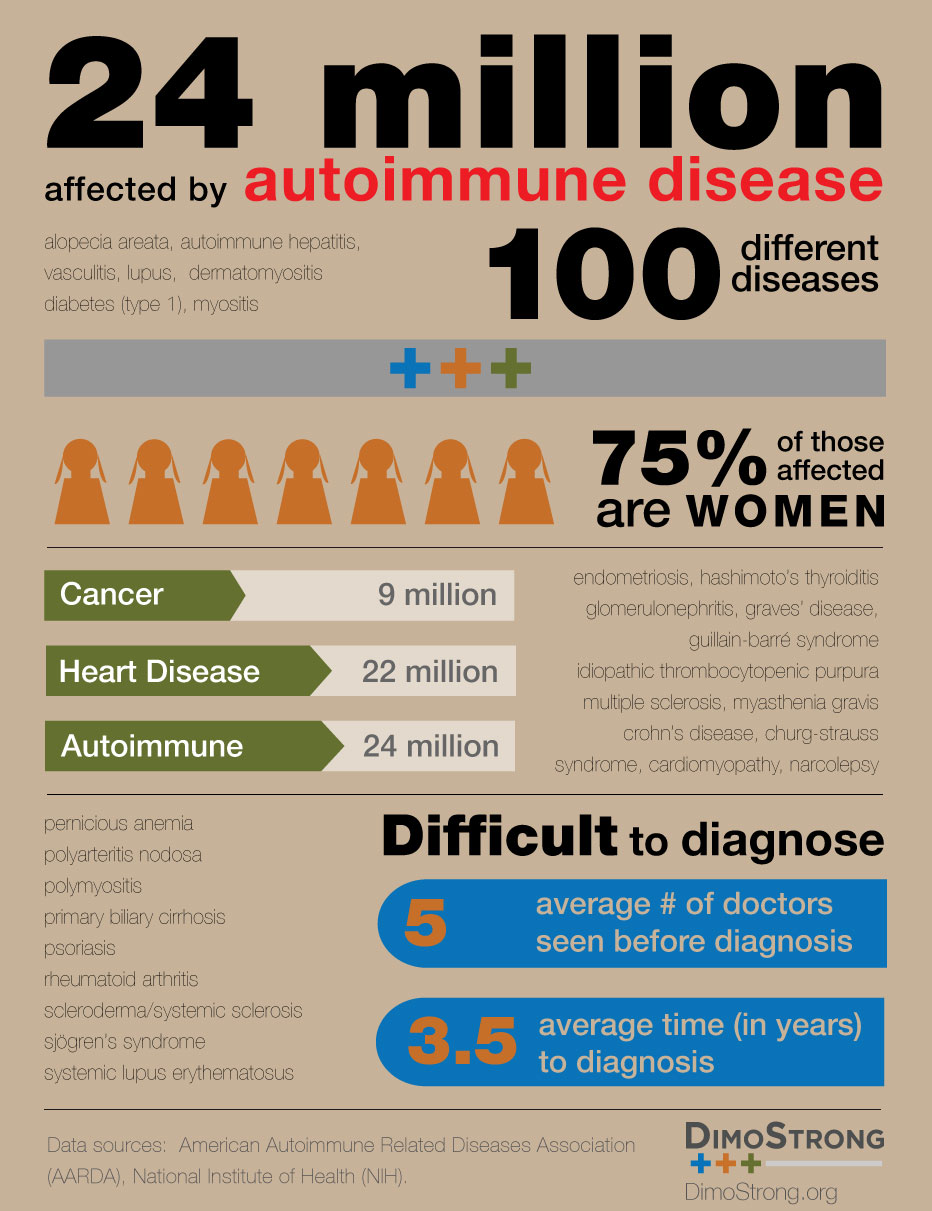How many women in your life suffer from an Autoimmune disease?
There is an invisible crisis going on, and at an alarming rate, women are suffering the affects the most. According to the American American Autoimmune Related Diseases Association (AARDA), they estimate a more accurate number closer to 50 million people affected by autoimmune disease in the U.S., and 75% of these people are women. That is more women affected by autoimmune conditions than cancer, diabetes, and other more commonly recognized diseases. If I look at the women in my family and my closest girl-friends, 8 out of ten are dealing with some level of an autoimmune issue.
Not only are women primarily affected by autoimmune conditions, but often times, getting an appropriate diagnosis and appropriate treatment can take up to a horrifying several years or more. My own mother has struggled with the symptoms of Hashimoto’s and Vitilago, and the inability to pinpoint the correct treatment for an entire lifetime.
Angela Crowley, MD, is up-front about it. “Accurately diagnosing an autoimmune disease can be tricky. People on average see six doctors over a period of 4 years before they get a diagnosis. This is because, in general, autoimmune diseases tend to arrive unpredictably, disguised as other conditions, offering only confusing clues as to what they are.” – The Detective Work of Autoimmune Disease, Amy Sarah Marshall | 10/31/2014
For myself, I am a classic example of this dichotomy. My road to diagnosis and treatment process has taken a decade to figure out, and even then, renown doctors from top institutions cannot confirm or deny my autoimmune condition. I was 24 years old when I was initially diagnosed with Myasthenia Gravis, both an autoimmune and neuromuscular disease. My symptoms have ranged over the years, from debilitating fatigue to muscle weakness to double vision, difficulty swallowing and more. However, when immediate surgical treatment didn’t work, and different medications ranging from oral steroids to immunoglobulin in-hospital treatment also didn’t work; doctors realized they may have been targeting the wrong autoimmune condition. Yay for me.
Without diving into the endless rabbit hole of trying to understand WHY we have such a horrendous autoimmune epidemic, WHY it primarily affects women, and WHY the diagnostic process is taking a WAY TOO LONG, I’d like to just offer several reasons as to why I think – based on my experience – WHY it is difficult for doctors to correctly diagnosis an autoimmune condition.
- Autoimmune diseases are 9/10 times invisible.
- Unless you have leprosy, or are missing a limb, people often look healthy on the outside.
- Autoimmune symptoms mimic hundreds of other conditions.
- Doctors look at you (as a woman), and think it MUST be your thyroid, blood sugar, or anxiety in your head. (thank god my doctors never thought this, but I know several friends who have experienced this)
- Doctors are sometimes lazy. (when symptoms are present, and your lab results confirm it is NOT your thyroid, blood sugar, or in your head – they give up and send you on your way with your unidentified autoimmune condition with no answers…”take the city bus if you are too tired”, they say)
- Doctors hit roadblocks. (when symptoms present, and your labs confirm something wonky, they just let it go because they don’t have a concrete answer)
- Many autoimmune diseases have not yet been identified. (I’ve been told my particular autoimmune issue is not yet identified, but that I do have wonky test results with autoimmune markers. You see, there is a ton of research going on right now to study and identify much more in the autoimmune world. I’ll be lucky if they identify my wonky labs in my lifetime.
Here is a wonderful article that highlights much of what I have brought up here, and more…
The Women’s Health Crisis No One Talks About
So, how many women in your life suffer from an Autoimmune disease? Are they mothers and do they struggle with symptoms while trying to raise their children? Do you have an autoimmune disease? If so, how does it affect your daily life, motherhood, and/or your family?
